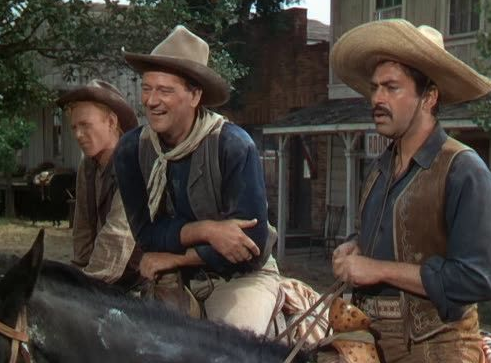3 Godfathers (1948), directed by John Ford, is a classic western that centers on three outlaws—Harry, William, and Stubby—who embark on a journey through the desert after a failed robbery. The film’s plot is marked by themes of redemption, sacrifice, and the transformative power of responsibility. It begins with the three outlaws escaping the law after a heist gone wrong. They find themselves in the vast, unforgiving desert with nothing but the clothes on their backs and the constant threat of death looming over them. Their lives take a drastic turn when they come across a dying woman, Mrs. Mallory, who is alone and struggling in labor in a small, isolated shack. In a rare act of compassion, they help her deliver her baby, though she dies shortly after childbirth. Before her death, Mrs. Mallory begs the men to take care of her newborn child.
The outlaws, hardened by a life of crime, initially show reluctance at the prospect of taking on such a responsibility, but they promise to honor her last request. As they continue their journey through the desert, their primary focus shifts from their own survival to the life of the child. The three men are thrust into a role they never imagined for themselves. As they try to find their way out of the desert, they face extreme conditions that test both their physical limits and their growing sense of duty to the baby. William, the most compassionate of the trio, becomes the primary caretaker, while Harry, the leader, insists they must reach safety as quickly as possible. Stubby, the youngest and least experienced outlaw, is unsure how to contribute, but over time, he rises to the occasion, realizing the gravity of their situation.
Through their journey, the men undergo significant transformations. They were once focused solely on their own survival, driven by self-interest and criminal motives, but their bond with the child forces them to reevaluate their lives and priorities. Their struggle in the desert is not just a physical one but an emotional and moral journey toward redemption. Harry, who initially seems like the tough, no-nonsense leader, begins to show a more vulnerable side. As the days pass, he reflects on his past and grows increasingly protective of the child, realizing that the baby's life represents something greater than their own. His journey becomes symbolic of redemption, as he takes responsibility for another life in a way he never thought possible.
However, their journey is fraught with obstacles, and despite their best efforts, their physical condition deteriorates under the harsh desert sun. The men are forced to face their mortality, and Harry, the strongest of the three, succumbs to the grueling environment, dying after making a final effort to ensure the child’s survival. His death marks a turning point in the film, as the remaining two outlaws, William and Stubby, are left to continue the mission alone. They struggle with the loss of their friend and leader, but their resolve to see the baby through to safety strengthens. The film takes on a more somber tone as the two remaining outlaws make their way toward a nearby town, where they hope to deliver the child to safety.

In their final trial, William and Stubby face near-death conditions as they make their way to the town. Despite their physical weakness, they manage to carry on, driven by their sense of responsibility for the child. As the film nears its end, it becomes clear that the men are not only fighting for the child’s survival but also for their own redemption. The film ends with the two men finally reaching the town, where the child is safely taken in by a sheriff and his wife. The outlaws’ sacrifice is recognized, and the child is raised in a safe, loving environment, far from the dangers of the desert and the violence of the men who had once been criminals.
3 Godfathers is not just a story about survival in the desert; it is a narrative about human connection and transformation. The three outlaws, through their willingness to protect and care for a child in need, evolve from selfish criminals to selfless figures of redemption. John Wayne’s portrayal of Harry is particularly notable, as he brings depth to a character that could have easily been a one-dimensional tough guy. The performances by the entire cast bring the story’s themes to life, particularly the way the men’s internal struggles are reflected in their interactions with each other and the baby.

The film’s ending is both tragic and hopeful, underscoring the idea that redemption can be found even in the most unlikely of individuals. The three outlaws, once considered irredeemable, become the "godfathers" of the child, leaving behind a legacy of sacrifice and love. The final moments of the film, where the baby is taken into the care of the sheriff and his wife, offer a sense of closure and peace. In the end, 3 Godfathers serves as a reminder that even in the harshest conditions, human kindness and the willingness to make sacrifices can lead to redemption and the possibility of a better future. The film, with its blend of adventure, drama, and heart, remains a testament to John Ford’s ability to craft a narrative that is both deeply emotional and thematically rich.





